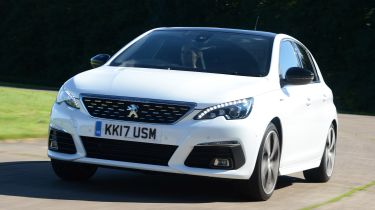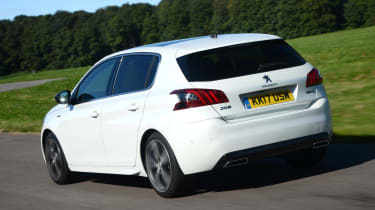Peugeot 308 (2013-2021) review
The Peugeot 308 is a stylish and well-equipped family hatchback, with a big boot and punchy engines

The latest Peugeot 308 is a far cry from the mediocre mid-size models the brand was making a decade ago. It's a classy and capable family hatch, with handsome styling and a well-finished interior. Updates for 2017 brought in fresh looks and safety tech, as well as a new diesel engine and auto gearbox.
Allure offers plenty of equipment for a relatively reasonable outlay. However, some rivals still offer better value, while so-so residuals and a clunky infotainment system count against it. Taller people may find the driving position difficult to get along with, too.
The 308 is relaxing and feels agile to drive, whie its pleasant ride quality and fluid handling inspire confidence. Nearly every engine is excellent, too, with the latest Peugeot PureTech petrol turbos being right on the pace of the BlueHDi diesels. For the first time, a petrol engine may be the better choice for many private buyers.
Passenger space isn’t as good as some rivals in the rear, as Peugeot has given the 308 a bigger boot than most of its rivals. Equipment is generous, and as of 2017 even the base model features sat-nav. Top models boast standard kit normally associated with premium cars, such as massage seats.
Used - available now
Overall, the Peugeot 308 is a top-notch family hatchback that should certainly be on your shortlist, alongside class favourites such as the Vauxhall Astra and Volkswagen Golf. Just make sure that the rear seats are big enough for you and that you can get on with the driving position before you sign on the dotted line.
The Peugeot 308 is one of the front-runners currently for sale in the compact hatchback class. Whichever model you choose, the 308 feels like an upmarket choice, thanks to its classy interior and handsome exterior looks. Body styles comprise a five-door hatchback and an estate called the 308 SW, while the flagship 308 GTi is a strong contender in the hot hatchback class.
If you want the looks of a GTi but not the running costs, Peugeot offers GT Line trim with smaller engines, while the 308 GT slots between the two with the option of petrol or diesel power. The rest of the range is made up by Allure and Active trims, while the Tech Edition is a special model with extra kit fitted as standard.
Rivals for the 308 are the usual suspects in the compact hatchback class. Chief among them are the Volkswagen Golf and Ford Focus, while the Renault Megane is an alternative French choice. Sister firm Citroen doesn't have a direct rival to the 308, although the C4 Cactus has been repositioned as a hatchback while the new C4 is developed. Elsewhere, the Hyundai i30 and Kia Ceed have both been updated recently, while the Honda Civic, Mazda 3, SEAT Leon, Skoda Octavia and Vauxhall Astra all have their merits, including practicality, low running costs, sporty handling and space.
The Peugeot 308 uses the PSA Group's EMP2 platform, which can also be found under the 3008 and 5008 SUVs, as well as the Citroen C4 SpaceTourer people carrier. This platform focuses on saving weight, and as a result the 308 handles far better than its predecessor, but is also more efficient without compromising performance. A major contributing factor to the 308's abilities is Peugeot's range of efficient yet punchy PureTech petrol and BlueHDi diesel engines.
The entry-level 1.2 PureTech 82 three-cylinder was dropped with the 308's 2017 facelift, and now there are just 110 and 130 versions of this engine offered with 108bhp and 128bhp respectively. Both cars get a six-speed manual gearbox as standard, while Peugeot's EAT8 eight-speed auto is an option on the more powerful petrol. Peugeot also offers a 1.6 PureTech 225 in the 308 GT, which has 222bhp, while the 308 GTi has a 1.6 PureTech 260 turbo petrol with 256bhp.
1.6 BlueHDi diesels were available at launch, but now the 308 uses Peugeot's latest 1.5 BlueHDi unit. There's a BlueHDi 100 offered in Active spec with 99bhp, while the rest of the range gets a BlueHDi 130 with 128bhp. The most powerful diesel is the older 2.0 BlueHDi 180 GT, which has 178bhp. The 1.5 comes with a six-speed manual gearbox, with an eight-speed EAT8 offered as an option on the 130 version. This gearbox is standard with the 2.0-litre diesel. All versions of the 308 are front-wheel drive, with no option for four-wheel drive, or even the Grip Control system that's available on the platform-sharing 3008 and 5008 SUVs.
One issue you might have with the 308 is its driving position. It was the third car, after the 208 and 2008, to get Peugeot's i-Cockpit layout, which features high-set dials and a small steering wheel designed to help you see them over the rim. While the driving position is better than you'll find in a 208, you still need to move the steering wheel down to your lap to see the dials properly, and not everybody will be able to get on with this low-armed driving position - combined with the small wheel some people might find it feels like you're driving a toy car.
Boot space in the 308 is good, and a capacity of 470 litres is among the best in the class. However, Peugeot has sacrificed rear passenger space to create the big boot, and rear legroom isn't the best - worth noting if you're planning on carrying passengers regularly.
If you want more carrying space, the 3008 SUV is larger, while the 308 SW is the estate version of the 308 hatch, and even bigger still. Biggest of all is the seven-seat 5008, which uses a similar platform to the 308.
The 308 is the latest in a long line of Peugeot hatchbacks, although not all have been class leaders. The previous generation 308 was a disappointment, which made the arrival of the new one a revelation in comparison, and one reason why it was awarded the 2014 European Car Of The Year title.
Before that was the ungainly 307, the elegant 306 and Peugeot's first compact hatchback, the 309, which itself replaced the Talbot Horizon within the PSA Group in the mid-eighties. There have been convertible versions of the hatch over the years, but the previous generation 308 CC has not been replaced.
For an alternative review of the latest Peugeot 308 Hatchback visit our sister site carbuyer.co.uk
More reviews
Car group tests
In-depth reviews
Long-term tests
Which Is Best
Most Economical
- Name1.6 Plug-in Hybrid 195 Allure 5dr e-DSC7
- Gearbox typeSemi-auto
- RRP£38,110













